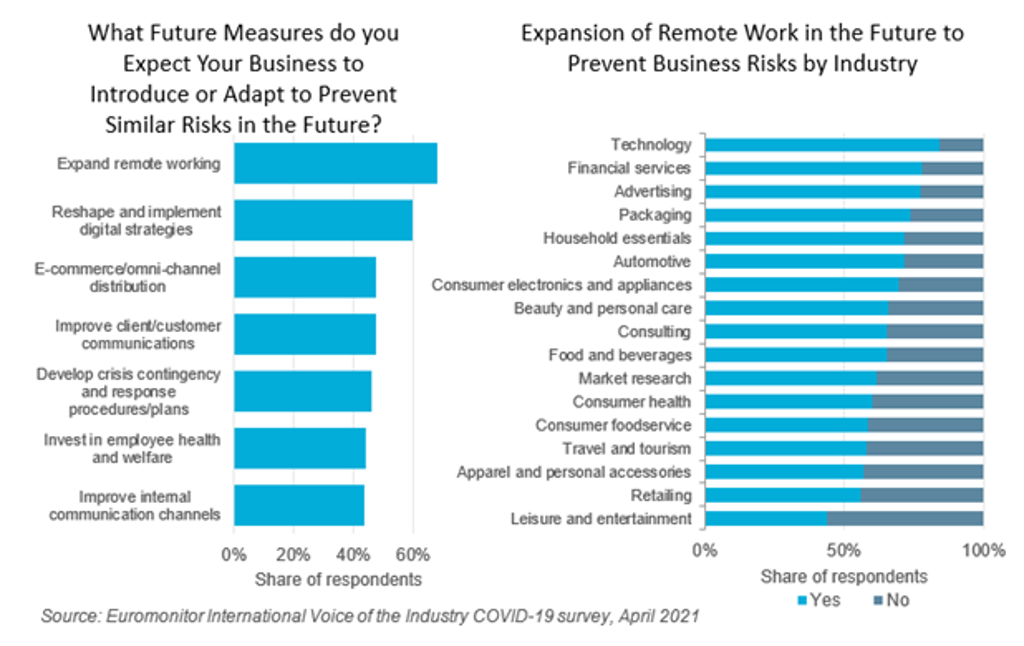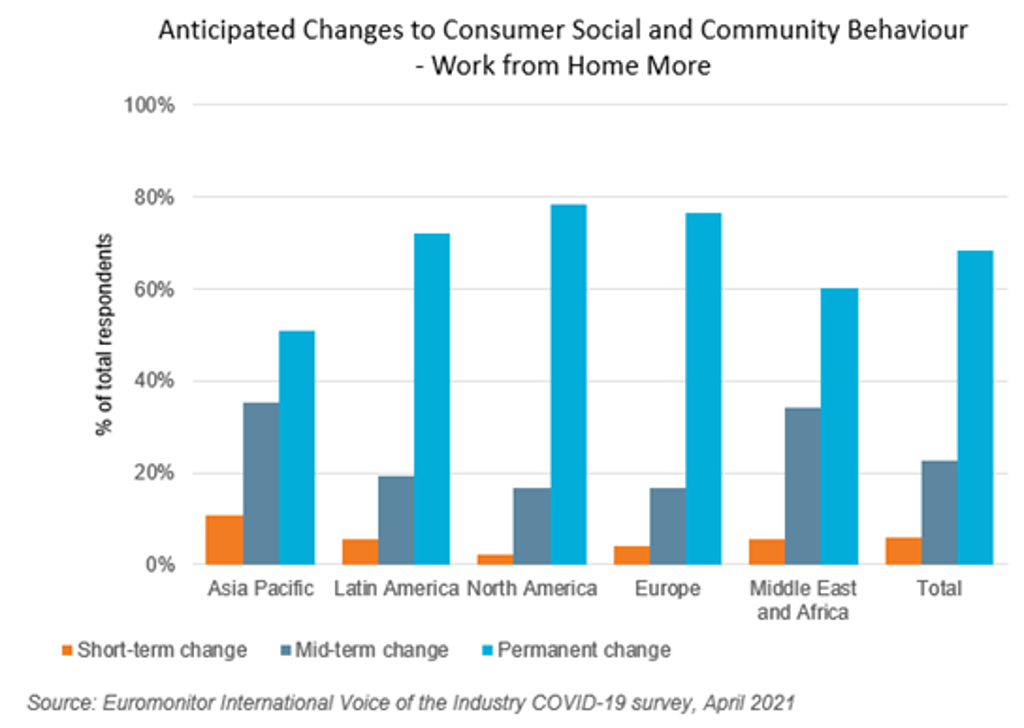The COVID-19 pandemic has accelerated changes in employees’ work preferences and employers’ attitudes towards remote working. While during strict quarantines companies were forced to adopt remote working practices, many are planning to retain teleworking options for their employees, and expand investments in communications and IT solutions, facilitating successful remote and hybrid work models.
While remote working allowed employees to achieve a better work-life balance, reduce commute time, improve social life and deal with family commitments, managing remote workers was a challenge for employers. As the hybrid work model is expected to prevail, companies are investing in online management tools as well as the training and development of their managers to be able to successfully manage remote teams and ensure a smooth transition for both those working in the office and remotely.
Remote work remains a path forward
The pandemic undoubtedly played a key role in promoting remote work, calling for businesses to invest in their online presence, remote work capacities and digital tools to keep employees informed, connected and productive. Given the growing preferences for a better work-life balance and cost saving among employees, enabling remote working will remain one of the top priorities for businesses. According to results from Euromonitor International’s Voice of the Industry: COVID-19 survey April 2021, nearly 70% of global industry specialists indicated plans to expand remote working opportunities to ensure smooth business continuity in case of any potential disruptions in the future. Results of the same survey also reveal that remote work expansion is expected across all industries, with technology companies leading the trend. Industry specialists, even in more human contact-heavy industries such as leisure and recreation, retailing, travel and tourism, and consumer foodservice, have also indicated rather high potential for remote work expansion, expecting to invest in their digital presence, and allowing some employees to work from home.

Moreover, remote work allows businesses to attract a more diverse talent pool by eliminating geographic boundaries and facilitating a more diverse and inclusive workplace. This is particularly beneficial for companies seeking to fill roles with very specific skillsets required, allowing them to search for employees globally. Nevertheless, the full scale of the effects of global teams on work culture remains in discussion. For instance, companies are contemplating questions of equal pay system – if members of the same team work in very contrasting countries in terms of their economic development and standard of living, should they be compensated the same? While some suggest equal pay for the same role, different living standards and consumer purchasing power suggest that pay should be amended accordingly. With further expansion of remote work and global talent acquisition these questions will gain increasing attention, not only from businesses but also from governments, aiming to facilitate hiring of their talent in the global market and ensuring fair taxation.
Ensuring operational continuity requires investments in digital tools
Reshaping and implementing digital strategies as well as expanding e-commerce, improving customer communications and developing crisis contingency response procedures were also among the top priorities for businesses, according to results from Euromonitor International’s Voice of the Industry: COVID-19 survey April 2021. In fact, during COVID-19 lockdowns, more than a half of industry specialists surveyed indicated that their companies had already taken steps to expand their digital capabilities. Most importantly, companies financed tools to facilitate remote working – expanding VPN capacities, and providing employees with online collaboration tools such as Microsoft Teams, Skype, and Zoom.

Every second company in the survey also indicated more frequent communications with both their clients and internal teams, aiming to support their day-to-day operations. Improved internal communication was expected to tackle concerns about workers’ productivity, participation and inclusion, create a sense of connectivity and community among employees. Nevertheless, too many virtual meetings and close monitoring of employees’ work might cause the opposite. According to a Google Workplace survey (October 2021), 68% of respondents felt that they had too many virtual meetings, threatening their productivity and general wellbeing.
New management practices needed in the era of hybrid work model
While remote working will see further expansion, businesses will also seek to bring back various benefits of face-to-face employee interaction such as building relationships, solving complex challenges, generating ideas and facilitating better collaborations. As a result, companies are embracing the hybrid work model, allowing employees to combine remote and office work. Nearly 70% of respondents of Euromonitor International’s Voice of the Industry: COVID-19 survey expressed belief that the hybrid work model will become a standard practice in their organisation.

In order to facilitate a successful shift towards the hybrid work model, companies face a need to invest in new management practices, alongside technological upgrades supporting remote teamwork and collaboration. For instance, an event firm based in Mumbai has set up its virtual office on metaverse, allowing new ways to reach international clients and connect remote teams. Respondents to a Google Workplace survey signposted that lack of face-to-face interaction between employees and their managers created a sense of distrust while working remotely: managers felt the need to monitor their teams more closely, while employees felt distressed by increased supervision. Moreover, survey respondents stress that limited networking opportunities also negatively reflect on employees’ career growth prospects. Companies will face challenges ensuring equal treatment of both office and remote workers, while managers will need new skills and tools to ensure smooth operations and avoid excessive micromanagement of their employees.
For further analysis please watch Euromonitor International’s The Future of Work and Education webinar, here.
